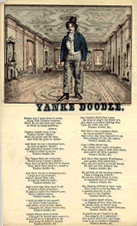
"Yanke Doodle" song sheet, date unknown.
- Printable version (PDF, 2.34 MB)
- Listen to a vocal performance
- Listen to a band performance
- Text transcription (PDF, 60 KB)
- Learn more about this period
Singing a song in Revolutionary America was not necessarily an innocent act. At the time, almost everyone sang in public on occasion, either for entertainment, for worship, or as part of their work. However, songs were also important instruments of satire and mockery. People used them to make fun of public figures, to pass ugly rumors, or to playfully insult their enemies—and sometimes their friends.
As opposition to British rule in the American colonies heated up, satirical songs took on a new edge. Rebellious colonists sang songs insulting Britain’s king, George III, as a drunken tyrant, and British soldiers answered with songs ridiculing the Americans as backwoods yokels.
One of these songs, which told the story of a poorly dressed Yankee simpleton, or "doodle", was so popular with British troops that they played it as they marched to battle on the first day of the Revolutionary War. The rebels quickly claimed the song as their own, though, and created dozens of new verses that mocked the British, praised the new Continental Army, and hailed its commander, George Washington.
By 1781, when the British surrendered at Yorktown, being called a "Yankee Doodle" had gone from being an insult to a point of pride, and the song had become the new republic’s unofficial national anthem.
Learn more
For more background information on this period, visit these presentations.
